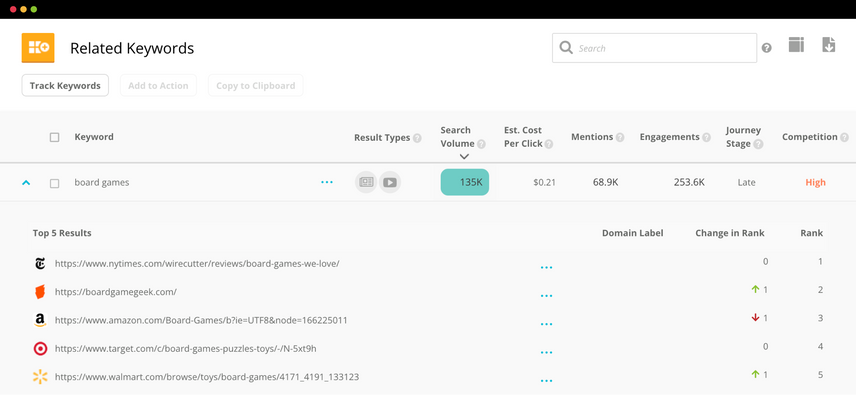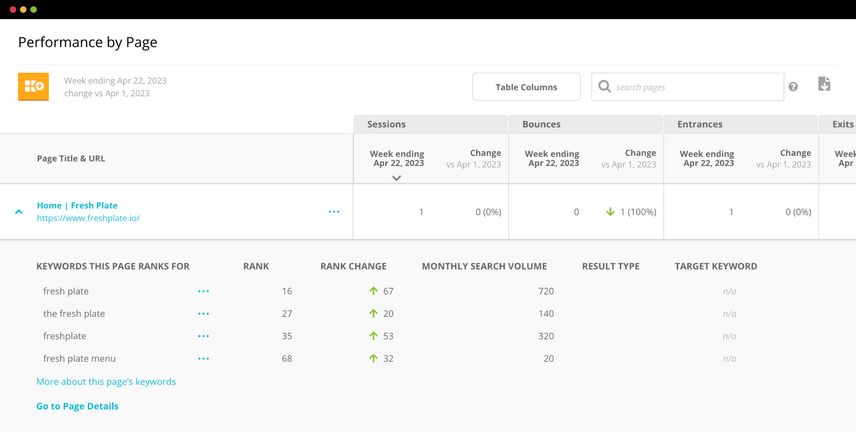The Ultimate Guide to SEO Keyword Competition Analysis
SEO keyword competition analysis is the process of learning what keywords your competitors are targeting to drive relevant traffic to their website.
By understanding what keywords your competitors are trying to rank for, you can find opportunities to improve your strategy and leapfrog them in SERPs for important queries.
If you take one thing from this article, it’s this: if you aren’t performing SEO keywordKeyword
A keyword is what users write into a search engine when they want to find something specific.
Learn more competitionCompetition
Businesses generally know who their competitors are on the open market. But are they the same companies you need to fight to get the best placement for your website? Not necessarily!
Learn more analysis, you’re leaving money on the table. Plain and simple.
The best way to learn and iterate on your SEO strategy is to try things, make mistakes, and improve your process. SEO is a hyper-competitive game, and your competitors and their keyword strategy are a great source of inspiration to improve your own SEO strategy and identify areas where you can improve. Whether you’re looking for new keywords to target or opportunities to optimize, an SEO keyword competition analysis is a process that should be part of every SEO strategy.
What are competitor keywords?
Before we get too far down the rabbit hole analyzing competitor keywords, we need to start with what they are. Competitor keywords are the keywords your direct and indirect competitors are targeting to improve their rankingsRankings
Rankings in SEO refers to a website’s position in the search engine results page.
Learn more and organic traffic.
Understanding the competitive landscape of a given keyword shows you how your competition is thinking about its SEO strategy. It gives insight into what your competitors find valuable and how they are trying to answer your audience's questions.
From there, you can decide what queries to target, what to avoid, and even where you have opportunities to optimize your existing content.
What is SEO keyword competition analysis?
SEO keyword competition analysis is the process of researching your direct and indirect competitors and the keywords they’re currently targeting and ranking for on SERPs.
Competitive keyword analysis gives you insight into your competitor’s overall SEO strategy, specifically, where they’re focusing their time and energy and how they try to satisfy their audience’s search intent.
Remember, your audience’s search intent is your guiding light for content creation, and it should be your competitors’ too, so getting a glimpse of their keyword strategy offers a new perspective on your audience, providing new topics and queries for creating content.
In addition, this process will uncover keywords and queries that your competitors are neglecting, giving you a golden opportunity to outrank them and drive significant short- and long-term traffic.
How to perform SEO keyword competition analysis
Now that we’ve got ‘the what’ covered, let’s get into how you can perform an SEO keyword competition analysis.
Step 1: Identify the competition
First things first, you can’t analyze competitor keywords if you aren’t clear on who all of your competitors are. You most likely have a good idea of your main business competitors, but on SERPs, you’re competing with websites you haven’t even considered.
For example, if your website sells board games, your direct business competitors may be sites like Amazon or Target. But the SERPs will also surface results detailing the history of board games or lists of board game cafes. These sites are competing with you for SERP real estate and can be just as threatening to your rankings as business competitors.
In order to identify all of your competitors—direct and indirect—you need to fold competitor identification into your usual keyword research tasks. This helps you get the lay of the competitive landscape and stay up to date on any new sites or competitors rising in the SERPs.
You can identify some competitors on your own by simply googling key phrases and queries you’re targeting. But in order to get a holistic view of your competitors, it helps to use the tool or SEO platform you use for keyword research .

Step 2: Analyze competitor content
Now that you know who you’re up against, it’s time to start diving into their content and keywords. This is where your keyword research tool is going to come in handy, for example, features like Explorer and Market Share on the Conductor platform uncover any site competing with you for keywords or topics and show you the other queries they’re ranking for.
Using this information, you can start to see where your site falls in the SERPs for certain keywords compared to the competition. This will undoubtedly show areas where you’re doing well and areas where you need to improve to start moving up in rankings.

Step 3: Identify promising keywords
By now, your competitor’s keyword strategy should be coming into focus. You know where they rank well and where they’re ranking poorly. Conductor’s Explorer feature can also show you how they’re been ranking for a certain keyword over time, helping you understand if their rankings for a query are improving over time.
All of this is great insight to use as inspiration when optimizing your keyword strategy. Keywords where multiple competitors have strong content may not be a query you want to target going forward, but one where your competition has shown no improvement in their rankings is one to target.
Be sure to be on the lookout for keywords that you don’t currently track or rank for, as well as keywords where you feel you’ll have a good chance to improve your rankings . Above all, base these decisions on the search intent of your audience, but keep in mind the search volumeSearch Volume
Search volume refers to the number of search queries for a specific keyword in search engines such as Google.
Learn more, buyer journey stage, and level of competition are also important factors.
Step 4: Export, organize, and track your work
Now that you have your analysis complete, you need to export and share your work across your content, marketing, and competitive intelligence teams. But more importantly, you must continue tracking your work and any changes you make to your keyword strategy. For example, the Explorer and Pages features in Conductor can show you changes in traffic, conversions, and rankings over time for a given page or keyword, as well as how it’s doing against competitors.

How often should you perform an SEO keyword competition analysis
You’ll want to perform an SEO keyword competition analysis about once per quarter. This will ensure that you’re up to date on the current competitive landscape of your site and will also allow you to optimize your content and strategy before your rankings are impacted too much.
Keep in mind that this is a rather time-consuming task—most audit-based processes tend to be—so don’t try and do this too frequently. In fact, performing this analysis too often can have you making changes to your site before the impact of previous changes can be fully felt.
How to leverage your findings from an SEO keyword competition analysis
Before you go too crazy making plans for what to do with your competitor’s keywords, remember that their SEO strategy is far from flawless. They may have strategies and initiatives that aren’t working, just like any other business. So don’t get too hung up on what your competitors are targeting; use it as inspiration, not as your roadmap.
With that said, inspiration is a great place to start when you’re trying to create and optimize content. With a window into what your competitors are doing well and what they aren’t, you have a chance to optimize your poorly performing content with new keywords and target keywords that your competitors haven’t even thought of.
Leverage your analysis to see where you have opportunities to grow and gain traffic, clicks, and brand awareness.
What competitor keywords should I target?
Great, so now I know how to find and leverage competitor keywords, but how do I know which one to target first? As I mentioned before, audience search intent should be your north star for content creation. Your goal should always be to create content that is helpful and relevant to your audience. If your goal isn’t to create helpful content, no amount of keyword competition analysis can help you.
Many people might say go by search volume and target the word with the most monthly traffic. While this is a solid indicator of how many people are searching for a keyword, it's not the best factor on to base this decision on. Some keywords have a high search volume but also extremely high competition, making it difficult for you to move up meaningfully on SERPs, regardless of your content’s quality.
Instead, aim for long-tail keywords or queries that have volume but less competition. For this aspect of the process, it’s best to always use search intent as your touchstone. If you understand what a user was hoping to find when searching a given term, you can better understand what content to create and which keyword is best for that content. Rather than throwing resources at a term that you most likely won’t rank for.
Check out our keyword research for beginner's guide that explains what makes for a great keyword.
Summing it up
Skilled SEOs know how to find value in places others may not think to look, and it’s no different when it comes to competitors. While most see competitors as a nuisance or necessary evil, you can learn to leverage your competition’s keyword strategy to strengthen your own. Find out what your competitors do well, so you can do it better.







